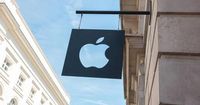The French antitrust authority has imposed a hefty fine of €150 million on Apple, accusing the tech giant of violating user privacy rules through its App Tracking Transparency (ATT) feature. This decision, reported by Bloomberg, marks a significant moment in the ongoing scrutiny of Apple's practices across Europe.
The investigation into Apple began after a coalition of advertisers lodged complaints with the French regulator, arguing that changes to data collection introduced in 2021 were detrimental to their revenues. According to the French authorities, the implementation of the ATT system complicates compliance with the European General Data Protection Regulation (GDPR), forcing developers to navigate a maze of pop-up windows.
"The goal of ATT itself is not subject to criticism, but the way it is implemented cannot be called necessary and reasonable for Apple's stated goal of protecting personal data," said Benoit Coeuré, head of the French antitrust department. The regulator views the implementation of ATT as a "misuse" of Apple's dominant position in the mobile advertising market.
While the French regulator has not mandated any changes to the ATT system, they have required Apple to publish the decision on its website within seven days. This ruling is especially alarming for smaller publishers, who rely heavily on third-party data collection for their business models. The regulator noted that the ATT framework "especially harms small publishers," as they struggle to compete in a market increasingly dominated by larger players.
Apple has expressed its disappointment with the ruling, stating that the ATT system provides users with greater control over their personal data. The company has argued that the framework is designed to enhance user privacy, allowing iPhone and iPad owners to decide which applications can track their activity. However, critics contend that Apple is using ATT to bolster its own advertising services while stifling competition.
This fine is the first of its kind imposed on Apple due to the ATT feature, which has drawn attention from regulators in several other European countries, including Germany, Italy, Romania, and Poland. In Germany, for example, the antitrust agency has accused Apple of providing itself with preferential conditions. Similar investigations are underway in other nations, as the European Union continues to tighten regulations on tech companies.
The ATT framework requires apps to obtain user consent through a pop-up window before tracking their activity across other applications and websites. If a user declines, the app loses access to crucial information necessary for targeted advertising. This has led to significant pushback from advertisers who argue that the changes have led to a decline in revenues.
Despite the controversy, Apple has remained firm in its stance on user privacy. The company claims that its measures are in line with the privacy expectations of its customers and that the ATT system is a step forward in protecting personal data.
As the debate continues, the implications of the French ruling could resonate beyond its borders. President Donald Trump has previously warned of retaliatory measures against disproportionate sanctions on American tech companies, suggesting that this fine could spark further tensions between the U.S. and European regulators.
With Apple preparing to launch its first folding iPhone, which is expected to be one of its most expensive devices yet, the company is keen to maintain its reputation as a leader in innovation and privacy. The smartphone is anticipated to be marketed as a premium gadget, leveraging artificial intelligence capabilities to attract consumers.
The outcome of the ongoing investigations and the response from Apple will be closely watched as they could set a precedent for how tech companies navigate privacy regulations in the future. The balance between user privacy and business interests remains a contentious issue, and as regulators tighten their grip, companies like Apple may need to adapt to a new landscape that prioritizes consumer rights.
As the landscape of digital advertising continues to evolve, the scrutiny faced by Apple is likely to intensify. The company must navigate these challenges while also addressing the concerns of advertisers and small publishers who feel threatened by the changes introduced by ATT. The fine imposed by the French regulator is just one chapter in a larger narrative about privacy, competition, and the future of digital advertising.





